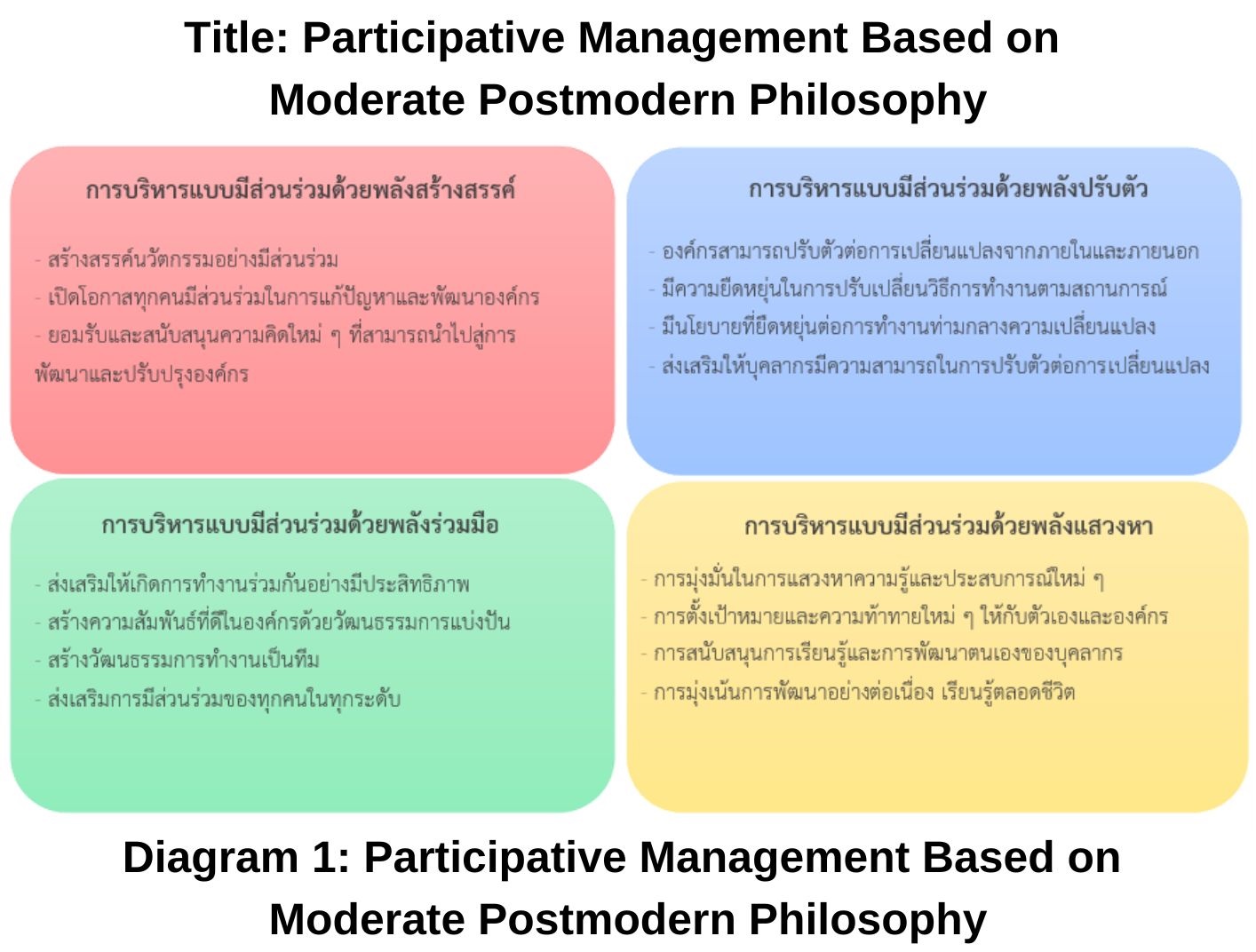Participative Management Based on Moderate Postmodern Philosophy
Keywords:
Participative Management, Philosophy, Postmodern, Moderate PostmodernAbstract
This study aims to analytically examine participatory management based on the principles of moderate postmodern philosophy. The analysis reveals that participatory management following the principles of moderate postmodern philosophy should involve creative, adaptive, cooperative, and exploratory management to achieve the highest quality of life for individuals within the organization. The findings are as follows: 1) Creativity: This includes promoting creativity and innovation from everyone within the organization, providing opportunities for personnel to participate in developing policies and work processes, accepting and supporting new ideas, and experimenting with new things that can lead to organizational development and improvement. 2) Adaptivity : This entails the organization's ability to respond to changes from both internal and external sources, having flexibility in adjusting working methods, policies, and practices according to the situation, embracing diversity and differences, and promoting personnel's ability to adapt to changes. 3) Collaborativity: This involves promoting effective teamwork, building good relationships within the organization, sharing information, knowledge, and resources equally, creating a culture of teamwork, fostering a sense of belonging within the organization, and encouraging everyone's participation in decision-making and operations. 4) Requisitivity: This focuses on the commitment to seeking new knowledge and experiences, setting new goals and challenges for oneself and the organization, supporting the learning and self-development of personnel, and emphasizing continuous development to move forward steadily
References
คณะกรรมการบริหารงานวิจัย. (2564). การพัฒนารูปแบบการบริหารแบบมีส่วนร่วมในโรงเรียนคุณภาพของชุมชน สังกัดสำนักงานเขตพื้นที่การศึกษาประถมศึกษานครศรีธรรมราช เขต 3. สำนักงานคณะกรรมการการศึกษาขั้นพื้นฐาน : กระทรวงศึกษาธิการ.
เจตนิพัทธ์ พิธิยานุวัฒน์ และคณะ. (2564). อุเบกขากับปรัชญาหลังนวยุคสายกลาง. วารสารสันติศึกษาปริทรรศน์ มจร, 9(5), 2051-2063.
ชัยโรจน์ นพเฉลิมโรจน์. (2565). การคิดนวัตกรรมด้วยหลักการทรงงานตามหลักปรัชญาหลังนวยุค. วารสารการวิจัยเพื่อพัฒนาชุมชน, 15(2), 111-117.
ทำนอง ภูเกิดพิมพ์. (2551). แนวคิดการบริหารแบบมีส่วนร่วมในการจัดการศึกษาของชุมชน. กรุงเทพฯ : จุฬาลงกรณ์มหาวิทยาลัย.
นัชชา ทิพเนตร. (2565). การมีส่วนร่วมของประชาชนและรูปแบบการมีส่วนร่วมที่ส่งผลต่อการ พัฒนาท้องถิ่นของเทศบาลตำบล จังหวัดนครราชสีมา. วารสารมหาจุฬานาครทรรศน์, 9(8), 395-413.
นันทกิตติ แก้วกล้า. (2553). การมีส่วนร่วมของครูผู้สอนในการบริหารงานวิชาการในโรงเรียนเขตตำบลท่ากระดาน สังกัด สำนักงานเขตพื้นที่การศึกษาฉะเชิงเทรา เขต 1. สารนิพนธ์การศึกษามหาบัณฑิต. บัณฑิตวิทยาลัย : มหาวิทยาลัยบูรพา.
นิเวศน์ วงศ์สุวรรณ และอินถา ศิริวรรณ. (2560). การบริหารแบบมีส่วนร่วม. วารสารมหาจุฬาวิชาการ, 4(1), 176-187.
พระครูโอภาสสราธิคุณ (ชาตรี อาสโภ). (2564). พุทธธรรมาภิบาลกับปรัชญาหลังนวยุคสายกลาง. วารสารสันติศึกษาปริทรรศน์ มจร, 9(4), 1444-1454.
รัตนา อยู่สุข. (2551). การมีส่วนร่วมในการบริหารโรงเรียนของครูโรงเรียนเอกชน ในเขตพื้นที่การศึกษาสมุทรปราการ เขต 1. วิทยานิพนธ์ครุศาสตร์มหาบัณฑิต. โครงการบัณฑิตศึกษา : มหาวิทยาลัยราชภัฏธนบุรี.
วัชรินทร์ อินทพรหม. (2557). รูปแบบการมีส่วนร่วมในการพัฒนาท้องถิ่นของประชาชน. วารสารบัณฑิตศึกษา มหาวิทยาลัยราชภัฏวไลยอลงกรณ์ ในพระบรมราชูปถัมภ์, 8(3), 278-289.
สิรินทร์ กันยาวิริยะ และชิสา กันยาวิริยะ. (2567). การบริหารธุรกิจ 5 กระบวนทรรศน์. วารสารสถาบันพอดี, 1(2), 17-31.
สุดธินีย์ ทองจันทร์, เมธา หริมเทพาธิป และกีรติ บุญเจือ. (2563). การพัฒนาคุณภาพชีวิตผู้ป่วยด้วยหลักปรัชญาหลังนวยุคสายกลาง. วารสารการวิจัยการบริหารการพัฒนา, 10(1), 31-41.
Douglas, Tom. (1988). Group : Understanding People Gathered Together. 3rd ed. New York : Rout ledge a Division of Rout ledge, Chapman and Hall.
Hoy, Wayne K. and G. Miskel Cecil. (1978). Educational Administration : Theory Research and Practice. New York : Random House.
Likert, Rensis. (1967). “The Method of Constructing and Attitude Scale”. In Reading in Fishbeic, M (Ed.), Attitude Theory and Measurement. (pp. 90-95). New York.
Likert, S. (1961). New patterns of management. New York : McGraw-Hill.
McClelland, David C. (1961). The Achieving Society. New York : D. Van Nostrand Company Inc.
Swansburg, Russell C. (1996). Management and Leadership for Nurse Managers. Boston : Jones and Bartlett Publishers.

Downloads
Published
How to Cite
Issue
Section
License
Copyright (c) 2024 Institute of Sufficiency Journal

This work is licensed under a Creative Commons Attribution-NonCommercial-NoDerivatives 4.0 International License.



